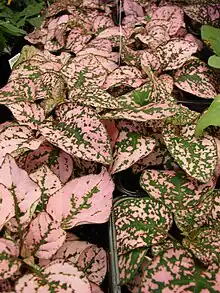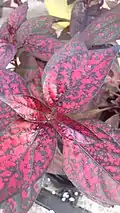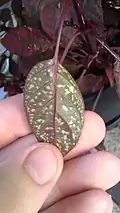Hypoestes phyllostachya
Hypoestes phyllostachya, the polka dot plant, is a species of flowering plant in the family Acanthaceae, native to South Africa, Madagascar, and south east Asia. The spots often merge into larger areas of colour.[1]
| Hypoestes phyllostachya | |
|---|---|
 | |
| Scientific classification | |
| Kingdom: | Plantae |
| Clade: | Tracheophytes |
| Clade: | Angiosperms |
| Clade: | Eudicots |
| Clade: | Asterids |
| Order: | Lamiales |
| Family: | Acanthaceae |
| Genus: | Hypoestes |
| Species: | H. phyllostachya |
| Binomial name | |
| Hypoestes phyllostachya Baker, 1887 | |
The genus name Hypoestes comes from the Greek hypo, meaning "under", and estia meaning "a house"; this refers to the calyxes being covered by bracts.[2] The Latin specific epithet phyllostachya means "with a leaf spike".[3]
Description


Growing to 30 cm (12 in) tall and broad, it is an evergreen shrub with leaves heavily-spotted pink or white, as if sprayed with paint. This small shrub with green foliage stained with pink-purple dots forms bushy and compact tufts. The leaves are opposite, oval and pointed. They are borne by petioles of 2 to 4 cm 1. The most common type has green leaves with pink spots, although it can range from white to any shade of pink to red. The spots on the undersides of the leaves are far lighter in color, often white.
It may produce small, solitary pink/purple flowers at the nodes that resemble honeysuckle. The small flowers form on the cob at the end of the stems and are pink/purple. The fruit is a many-seeded dehiscent capsule.
Cultivation
Hypoestes phyllostachya is cultivated as an ornamental plant and is familiar as a houseplant, but can also be grown outside as an annual plant in cooler climates or a perennial in the subtropics and tropics.[1] In the UK it has gained the Royal Horticultural Society’s Award of Garden Merit.[4][5] Many different cultivars have been created with different foliage colors.
This plant does best in partial sun. In the United States, it is winter hardy in zones 10 and 11.[2] It has low drought tolerance, but is rarely damaged by deer.[6] It spreads by cuttings and seedlings.
Cultivars
Hypoestes phyllostachya has a multitude of cultivars whose leaves are green, white or red (from pink to carmine), punctuated, stained or streaked with green, white or red among which can be mentioned :
- H. phyllostachya 'Camina' with dark green leaves and carmine red
- H. phyllostachya 'Confetti Blush', white veined olive green
- H. phyllostachya 'Pink Splash', green and pale pink
- H. phyllostachya 'Red Splash', green and red
- H. phyllostachya 'White Splash', green and white
Gallery
 In Madagascar
In Madagascar Glossy pink and dark green blobs
Glossy pink and dark green blobs With white dots
With white dots Large white dots
Large white dots Leaves with pink marks
Leaves with pink marks Purple flower
Purple flower Closeup flower
Closeup flower
References
- "Hypoestes phyllostachya". Missouri Botanical Garden. Retrieved 10 March 2018.
- "Hypoestes phyllostachya - Plant Finder". www.missouribotanicalgarden.org. Retrieved 2021-03-05.
- Harrison, Lorraine (2012). RHS Latin for Gardeners. United Kingdom: Mitchell Beazley. ISBN 978-1845337315.
- "RHS Plantfinder - Hypoestes phyllostachya". Retrieved 9 March 2018.
- "AGM Plants - Ornamental" (PDF). Royal Horticultural Society. July 2017. p. 52. Retrieved 2 March 2018.
- "Hypoestes phyllostachya (Baby's Tears, Flamingo Plant, Freckle Face, Measles Plant, Pink Splash, Polka Dot Plant) | North Carolina Extension Gardener Plant Toolbox". plants.ces.ncsu.edu. Retrieved 2021-03-05.